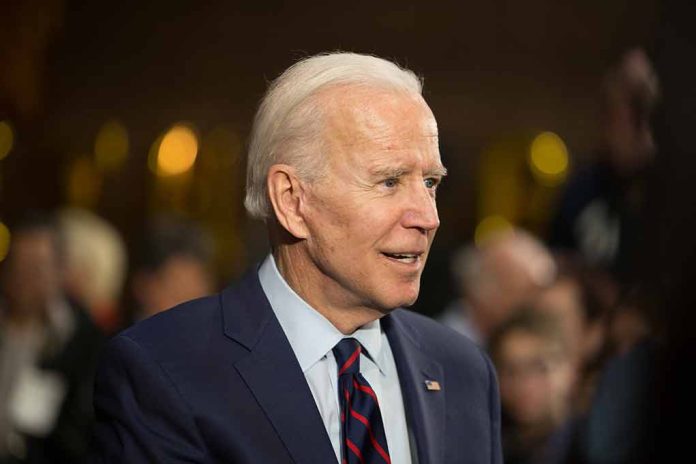
The controversy over President Biden’s Gaza Pier initiative raises serious questions about the balance between humanitarian objectives and regional security.
At a Glance
- President Biden ordered the construction of a temporary pier to deliver humanitarian aid to Gaza amid opposition from multiple agencies.
- The project faced numerous security and feasibility concerns, leading to criticisms about its effectiveness and cost.
- Aid groups withdrew due to weather and security issues, curtailing the distribution of food and emergency supplies.
- The project cost $230 million and was intended to operate for about 20 days but suffered repeated disruptions.
- Republicans in Congress criticized the initiative as wasteful and ineffective, given the project’s various challenges.
President Biden’s Gaza Pier Initiative: An Overview
President Biden’s push to construct a temporary pier in Gaza for delivering humanitarian aid has sparked a significant debate. The Joint Logistics Over-the-Shore system (JLOTS) project, estimated to cost $230 million, aimed to provide emergency supplies to Gaza’s residents. However, Biden faced considerable opposition from USAID staffers who argued that the focus should remain on more reliable land crossings.
Despite these advisories, the President proceeded, emphasizing the dire humanitarian situation in Gaza. The U.N. reported that nearly all of Gaza’s 2.3 million residents are struggling to find food, with over half a million people facing starvation. Biden’s administration intended to feed 1.5 million people for 90 days but managed to provide for only 450,000 people for one month. High waves and bad weather repeatedly damaged the pier, making it difficult to achieve its objectives.
— The Western Journal (@WestJournalism) August 28, 2024
Security and Feasibility Concerns
USAID staffers expressed concerns that focusing on JLOTS would undercut efforts to open more efficient land routes. “Once the President issued the directive, the Agency’s focus was to use JLOTS as effectively as possible,” reported the inspector general.
“Multiple USAID staff expressed concerns that the focus on using JLOTS would detract from the Agency’s advocacy for opening land crossings, which were seen as more efficient and proven methods of transporting aid into Gaza,” according to the inspector general report. “However, once the President issued the directive, the Agency’s focus was to use JLOTS as effectively as possible.”
The pier, placed in central Gaza contrary to an agreement placing it in the north, also faced operational issues. The U.S. failed to secure a neutral party for security, prompting Israel’s military to step in. Aid groups eventually pulled out by July due to severe weather and security issues, severely limiting the aid delivered. Reports also highlighted instances of aid convoys being looted and drivers detained or shot at.
President Joe Biden ordered the construction of a temporary pier to deliver humanitarian aid to Gaza earlier this year even as some staffers for the U.S. Agency for International Development expressed concerns that the effort would be difficult to pull… https://t.co/ZcJ2dA13LF
— The Washington Times (@WashTimes) August 28, 2024
Questioning the Effectiveness
National Security Council spokesman Sean Savett acknowledged the project’s obstacles but emphasized its impact. “The bottom line is that given how dire the humanitarian situation in Gaza is, the United States has left no stone unturned in our efforts to get more aid in, and the pier played a key role at a critical time in advancing that goal,” Savett said in a statement.
Repercussions and Criticisms
Republicans in Congress criticized the project as an ineffective use of taxpayer funds due to logistical and security failures. They argued that the resources could have been better allocated towards proven methods like land crossings. Biden acknowledged the shortfalls in a July press conference, highlighting the difficulties encountered.
U.S. National Security Council spokesman Sean Savett said Tuesday that the project “had a real impact” in getting food to hungry Palestinian civilians despite the obstacles.
The broader implications of this initiative reveal the complexities in balancing humanitarian aspirations and regional security. As the situation in Gaza continues to deteriorate, with over 1.4 million people displaced and facing critical shortages of basic necessities, the effectiveness and decision-making behind such initiatives are under intense scrutiny.
Sources
- Biden pushed Gaza pier over warning it would undercut other aid routes, watchdog says
- Biden approved Gaza pier despite internal pushback, watchdog finds
- Biden ignored warnings Gaza aid pier would be boondoggle, comptroller charges
- Watchdog: Biden pushed forward with Gaza pier despite warnings of weather, security issues
- Amid Increasingly Dire Humanitarian Situation in Gaza, Secretary-General Tells Security Council Hamas Attacks Cannot Justify Collective Punishment of Palestinian People
- Joe Biden ordered Gaza pier to be built despite fears of aid experts
- The Trouble With Allies: America Needs a Playbook for Difficult Friends
- U.S. silent as global condemnation of Israel’s Rafah offensive grows







